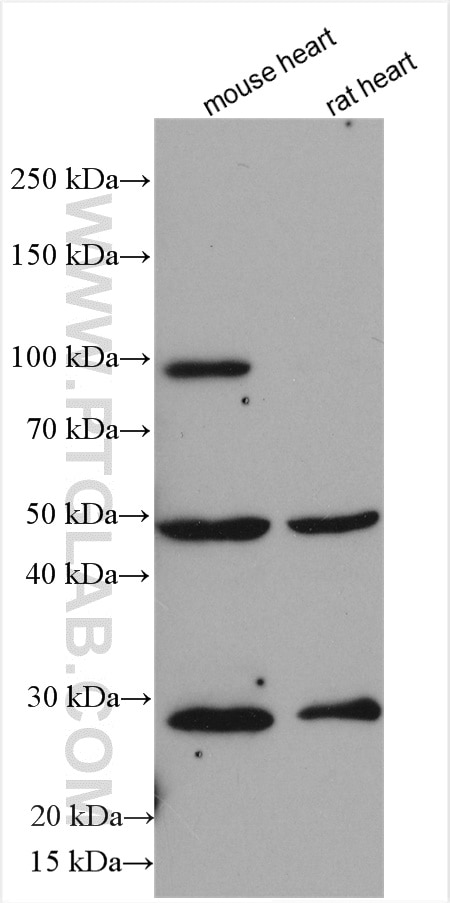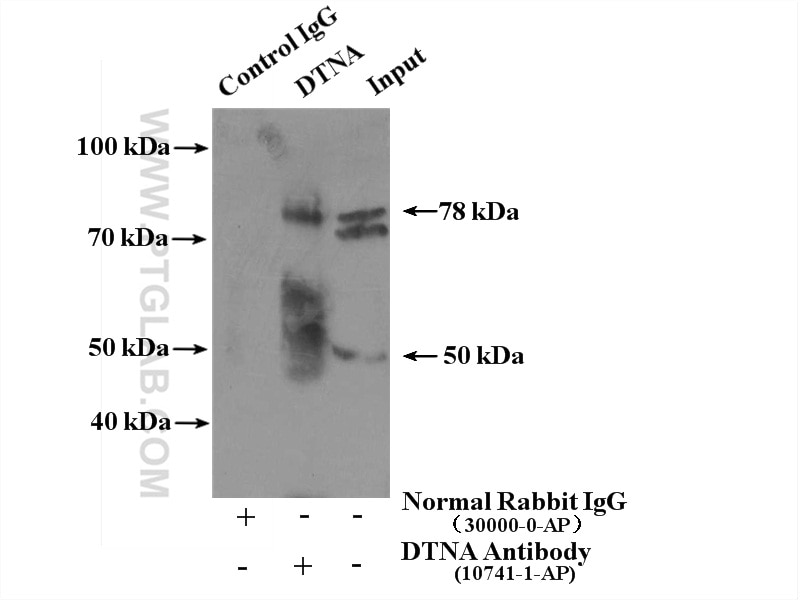Tested Applications
| Positive WB detected in | mouse heart tissue, rat heart |
| Positive IP detected in | mouse brain tissue |
Recommended dilution
| Application | Dilution |
|---|---|
| Western Blot (WB) | WB : 1:500-1:1500 |
| Immunoprecipitation (IP) | IP : 0.5-4.0 ug for 1.0-3.0 mg of total protein lysate |
| It is recommended that this reagent should be titrated in each testing system to obtain optimal results. | |
| Sample-dependent, Check data in validation data gallery. | |
Product Information
10741-1-AP targets DTNA in WB, IP, ELISA applications and shows reactivity with human, mouse, rat samples.
| Tested Reactivity | human, mouse, rat |
| Host / Isotype | Rabbit / IgG |
| Class | Polyclonal |
| Type | Antibody |
| Immunogen | DTNA fusion protein Ag1075 Predict reactive species |
| Full Name | dystrobrevin, alpha |
| Calculated Molecular Weight | 42 kDa |
| Observed Molecular Weight | 25, 49-59 kDa, 78-85 kDa |
| GenBank Accession Number | BC005300 |
| Gene Symbol | DTNA |
| Gene ID (NCBI) | 1837 |
| RRID | AB_2093895 |
| Conjugate | Unconjugated |
| Form | Liquid |
| Purification Method | Antigen affinity purification |
| UNIPROT ID | Q9Y4J8 |
| Storage Buffer | PBS with 0.02% sodium azide and 50% glycerol , pH 7.3 |
| Storage Conditions | Store at -20°C. Stable for one year after shipment. Aliquoting is unnecessary for -20oC storage. 20ul sizes contain 0.1% BSA. |
Background Information
DTNA (dystorbrevin alpha) is a cytoskeleton associated protein and an essential component of dystrophin protein complex. It is highly expressed in brain, heart and skeletal muscle. Alternative splicing generates several isoforms ranging from 22 to 84 kDa.
Protocols
| Product Specific Protocols | |
|---|---|
| WB protocol for DTNA antibody 10741-1-AP | Download protocol |
| IP protocol for DTNA antibody 10741-1-AP | Download protocol |
| Standard Protocols | |
|---|---|
| Click here to view our Standard Protocols |





